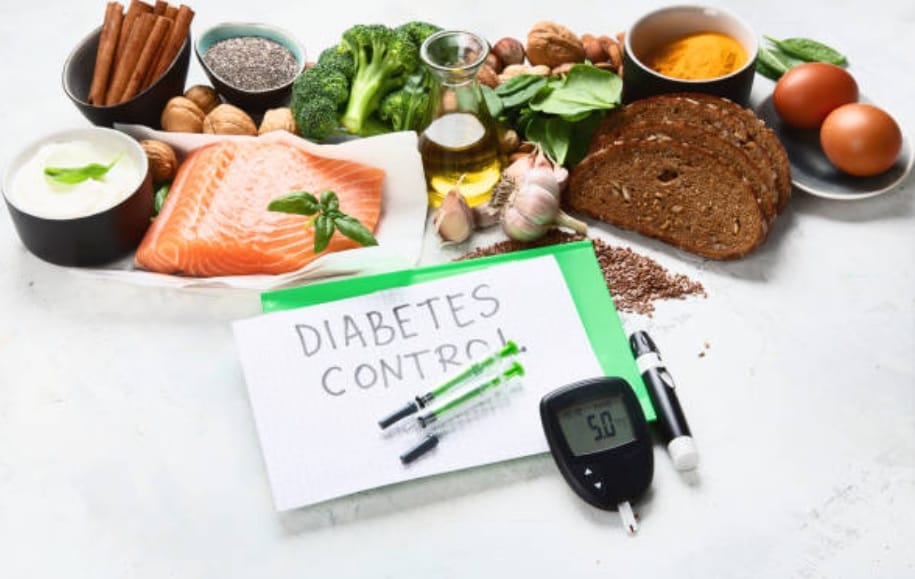The keto diet is widely known for its benefits in managing weight and improving overall health, especially for people with type 2 diabetes. But what about those living with type 1 diabetes? Can a keto diet help? we will explore the relationship between the keto diet and type 1 diabetes, explaining what this low-carb, high-fat diet involves and its potential impacts on people with type 1 diabetes.
If you’re not sure whether the keto diet for type 1 diabetes is a good idea or whether type 1 diabetics can do the keto diet, this post will answer your questions in simple, easy-to-understand terms.
What is the Keto Diet?
The ketogenic or keto diet is a low-carb, high-fat eating plan that forces the body into a state called ketosis. When in ketosis, your body burns fat for fuel instead of relying on carbohydrates (sugar or glucose) as its primary source of energy.
Here’s a breakdown of how the keto diet works:
- High fat: About 70%–75% of daily calorie intake comes from healthy fats.
- Moderate protein: About 20%–25% comes from protein.
- Low carbs: Only about 5%–10% of calories come from carbohydrates (usually 20–50 grams of carbs per day).
How the Keto Diet Affects Blood Sugar and Insulin
For people without diabetes, a low-carb diet like keto helps stabilize blood sugar levels and prevents spikes and crashes in insulin levels. This is because the body relies on fat instead of carbs for energy. But if you have type 1 diabetes, things work a bit differently.
Type 1 Diabetes and Low-Carb Diet
People with type 1 diabetes don’t produce insulin, a hormone that helps your body manage blood sugar. Without insulin, sugar can’t get into cells to be used for energy, causing blood sugar levels to rise. Type 1 diabetics must take insulin daily to manage their blood sugar.
A low-carb diet for type 1 diabetics—like the keto diet—can lower the amount of insulin required because fewer carbs mean less blood sugar for insulin to manage. However, it’s not without risks, as the keto diet can cause blood sugar levels to fluctuate.
Benefits of Keto Diet for Type 1 Diabetics
So, can type 1 diabetics do the keto diet? Yes, some can! But it requires careful planning, medical supervision, and a deep understanding of how your body responds to the keto diet. Here are some potential benefits of the keto diet for type 1 diabetics:
1. Improved Blood Sugar Control
Since the keto diet limits carb intake, it can reduce the need for insulin, as there is less glucose entering the bloodstream. Some people with type 1 diabetes report more stable blood sugar levels when following a low-carb or keto diet.
2. Reduced Insulin Doses
By eating fewer carbs, some type 1 diabetics on the keto diet can lower their insulin doses. With fewer carbs to process, the body requires less insulin, making blood sugar management simpler.
3. Weight Loss
The keto diet is known to help with weight loss. For type 1 diabetics who are overweight or struggle to manage their weight, the keto diet may help reduce body fat while improving overall health.
4. Increased Energy Levels
Because the keto diet provides steady energy from fats, some people feel more energized throughout the day. This can be particularly beneficial for people with type 1 diabetes, who often experience energy crashes related to fluctuating blood sugar levels.
Risks of Keto Diet for Type 1 Diabetics
While the keto diet has some benefits, it also comes with potential risks, particularly for people with type 1 diabetes. Here are some challenges and concerns to keep in mind:
1. Risk of Diabetic Ketoacidosis (DKA)
The biggest concern with the keto diet for type 1 diabetics is the risk of diabetic ketoacidosis (DKA). DKA happens when ketone levels in the blood become dangerously high, causing the blood to become acidic. This can lead to severe complications or even death if not treated quickly.
While ketosis is safe for most people on the keto diet, people with type 1 diabetes are more prone to developing DKA, especially if insulin levels are too low.
2. Hypoglycemia (Low Blood Sugar)
People with type 1 diabetes who are on the keto diet may experience episodes of hypoglycemia (low blood sugar) because they are consuming fewer carbs. Lower insulin doses can help prevent this, but it still requires careful monitoring. Hypoglycemia can cause dizziness, confusion, and fainting.
3. Nutritional Deficiencies
A low-carb diet like keto can lead to deficiencies in essential nutrients, including fiber, vitamins, and minerals, especially if you’re not careful about the foods you’re eating. This can cause digestive issues, weakened immunity, and other health problems.
4. Difficulty in Long-Term Adherence
Following a strict keto diet can be challenging. The restrictions on carbs and the emphasis on fat can make it hard for some people to stick with long-term. It can also be difficult to enjoy social events, meals out, and favorite foods.
How to Follow the Keto Diet Safely with Type 1 Diabetes
If you’re considering trying the keto diet for type 1 diabetes, it’s important to do so under the supervision of a healthcare professional, preferably a doctor or dietitian with experience managing diabetes. Here are some tips to follow the keto diet safely if you have type 1 diabetes:
1. Monitor Blood Sugar Frequently
You’ll need to check your blood sugar levels more frequently when starting the keto diet to ensure they’re within a safe range. Your insulin needs may change, so you’ll want to adjust accordingly to avoid hypoglycemia or dangerously high blood sugar levels.
2. Watch for Signs of Ketoacidosis
It’s essential to monitor for signs of DKA, including excessive thirst, frequent urination, nausea, and stomach pain. You can also use urine or blood tests to check your ketone levels.
3. Work with a Dietitian
A dietitian can help you create a well-balanced keto meal plan that provides all the nutrients your body needs while keeping carb intake low. They can also help you adjust your insulin doses and ensure you’re following the diet safely.
4. Hydrate and Stay Balanced
Drinking plenty of water and maintaining electrolyte balance is crucial on the keto diet. Since the diet is low in carbs, you might experience more fluid loss, which can lead to dehydration and electrolyte imbalances.
5. Consider Gradual Changes
Instead of jumping into a full keto diet, consider reducing your carb intake slowly. This can help your body adjust to the changes and minimize any side effects.
YOU MAY ALSO LIKE : Green Keto Diet: A Plant-Focused Low-Carb Lifestyle
Foods to Eat and Avoid on the Keto Diet for Type 1 Diabetes
If you’ve decided to try the keto diet with your doctor’s approval, here’s a list of foods that are keto-friendly and those to avoid to keep your carb intake low.
Keto-Friendly Foods:
- Meat and poultry: Chicken, beef, turkey, and pork.
- Fish and seafood: Salmon, tuna, mackerel, and shrimp.
- Eggs: A great source of protein and fats.
- Leafy greens and low-carb vegetables: Spinach, kale, broccoli, and zucchini.
- Healthy fats: Avocado, olive oil, coconut oil, and butter.
- Nuts and seeds: Almonds, walnuts, chia seeds, and flaxseeds.
- Cheese: Many types of cheese are low in carbs.
- Berries (in moderation): Strawberries, raspberries, and blueberries.
Foods to Avoid:
- Sugary foods and drinks: Soda, candy, cake, and desserts.
- Grains and starches: Bread, pasta, rice, and cereals.
- High-carb fruits: Bananas, apples, grapes, and oranges.
- Legumes: Beans, lentils, and chickpeas.
- Processed and packaged snacks: Chips, crackers, and granola bars.
Can Type 1 Diabetics Do the Keto Diet?
The keto diet and type 1 diabetes can be a tricky combination. While there are potential benefits, including
improved blood sugar control and reduced insulin doses, the risks of DKA and hypoglycemia are significant. It’s essential to work closely with a healthcare professional, monitor blood sugar and ketones, and be prepared for the challenges that may come with the diet.
Ultimately, the keto diet for type 1 diabetes can be helpful for some but isn’t suitable for everyone. If you’re considering trying a low-carb diet for type 1 diabetes, make sure you understand the risks, take precautions, and seek guidance from medical experts.


